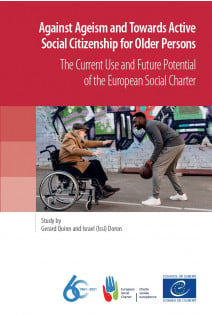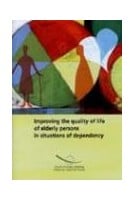FOREWORD INTRODUCTION 1. IDEAS: THE EVOLUTION OF IDEAS AND LAW ON THE RIGHTS OF OLDER PERSONS
1.1 The importance of terminology: age, ageing, old age and older persons
1.2 The ageing of Europe
1.3 Some unique aspects of the ageing of Europe
1.4 Combatting ageism whilst embracing the ageing of Europe
1.5 A 21st century human rights agenda – uprooting ageism in law and practice
2. THE UNITED NATIONS AND OTHER REGIONAL INITIATIVES
2.1 UN system - Stage 1: invisibility in UN instruments (1940s-1980s)
2.2 UN system - Stage 2: ageing as an economic development/social problem
2.3 UN system – Stage 3: the struggle for recognition, personhood, group identity and human rights
2.4 Regional action in the Americas – the Inter-American Convention on protecting the rights of older persons
2.5 Regional action in Africa - Protocol to the African Charter on Human and Peoples’ Rights on the rights of older persons in Africa (2016)
3. REGIONAL RECEPTION OF THE NEW THINKING: EUROPEAN REGIONAL DEVELOPMENTS
3.1 Council of Europe
3.2 European Union
3.3 Conclusions – overall European trends against ageism
4. THE EUROPEAN SOCIAL CHARTER TREATY SYSTEM: PRACTICE AND PROCEDURE
4.1 The Treaties explained
4.2 The rights protected
4.3 European Committee of Social Rights - practice and procedures.
4.4 The role of the Governmental Committee of the European Social Charter and the European Code of Social Security
4.5 The role of the Committee of Ministers of the Council of Europe with respect to the European Social Charter
4.6 Conclusions: facing the future with the Charter
5. THE CENTRALITY OF EQUAL TREATMENT/NON-DISCRIMINATION IN THE CHARTER (ARTICLE E): SOCIAL CITIZENSHIP REFRESHING SOCIAL RIGHTS
5.1 Equality as an overarching guarantee
5.2 The addition of Article E in 1996
5.3 Three phases of thinking about equality/non-discrimination in the UN treaty system
5.4 The European Committee of Social Rights jurisprudence under Article E: autonomy, respect for difference, inclusion and active citizenship
5.5 Discrimination methodology under the European Social Charter
5.6 Conclusions: the added value of equality in considering the social rights of older persons
6. THE CONCEPT OF ”PROGRESSIVE REALISATION” UNDER THE EUROPEAN SOCIAL CHARTER: IMPLICATIONS FOR THE RIGHTS OF OLDER PERSONS
6.1 Background to the concept
6.2 Origin and use of the concept in the ICESCR
6.3 The evolution of “progressive realisation”’ in the European Social Charter
6.4 Conclusions: How to frame the parameters of “progressive realisation” under the Charter: key benchmarks and relevance for older persons
7. ARTICLE 23 OF THE EUROPEAN SOCIAL CHARTER: THE SWORD AND SHIELD OF THE EUROPEAN SOCIAL CHARTER AGAINST AGEISM
7.1 The reporting system and the Committee's conclusions on Article 23
7.2 The operationalisation of social rights: the Committee’s standards for examining State reports under Article 23
7.3 The collective complaints system and Article 23
7.4 Article 23 – from invisibility to visibility of older person’s social rights
8. SUBSTANTIVE SOCIAL RIGHTS AND OLDER PERSONS
8.1 Economic independence: the right to work (Article 1)
8.2 A social floor – freedom from want: rights to social security (Article 12), social and medical assistance (Article 13), freedom from poverty and social exclusion (Article 31)
8.3 Housing – independent living and being included in the community (Article 31)
8.4 Health – a right to equal treatment (Article 11)
8.5 Family support – the ecosystem for older persons (Article 16)
8.6 Conclusions – using the full spectrum of social rights for older persons
9. EMERGENCIES AND THE EUROPEAN SOCIAL CHARTER: KEY PRINCIPLES
9.1 Derogations, restrictions and retrogressive measures under the European Social Charter
9.2 Statement of interpretation of the European Committee of Social Rights on the right to protection of health in times of pandemic
9.3 Thematic questions from the Committee to States Parties on health social security and social protection (2021)
9.4 Conclusions – emergencies make social rights more rather than less important
10. THE ENGAGEMENT OF GOVERNMENTS WITH THE RIGHTS OF OLDER PERSONS AND UNDER THE EUROPEAN SOCIAL CHARTER
10.1 Summary of the responses
10.2 Analysis of the responses
11. ENGAGEMENT OF NATIONAL HUMAN RIGHTS INSTITUTIONS AND NATIONAL EQUALITY BODIES WITH THE EUROPEAN SOCIAL CHARTER
11.1 Summary of the responses
11.2 Analysis of the responses
12. CIVIL SOCIETY ENGAGEMENT WITH THE EUROPEAN SOCIAL CHARTER: SURVEY RESULTS AND ANALYSIS
12.1 Results of the survey
12.2 Analysis of the survey results
13. CONCLUSIONS AND KEY RECOMMENDATIONS
13.1 Conclusions
13.2 Recommendations
BIBLIOGRAPHY LIST OF ABBREVIATIONS








